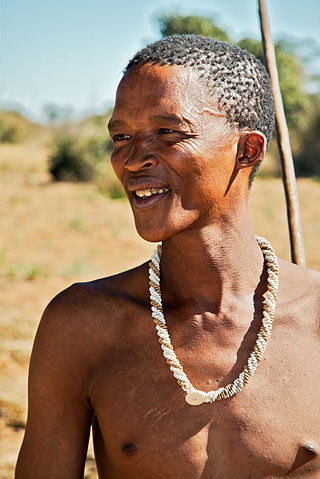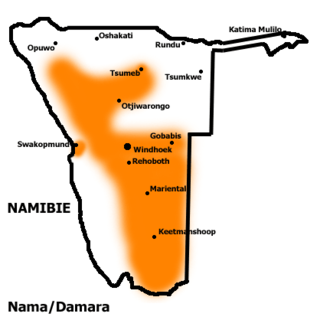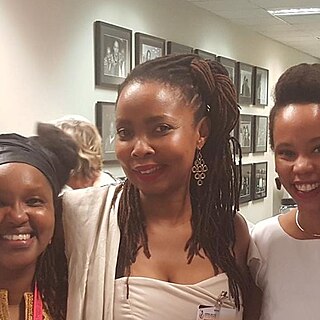Related Research Articles

Cape Coloureds are a South African ethnic classification consisting primarily of persons of mixed race African, Asian and European descent. Although Coloureds form a minority group within South Africa, they are the predominant population group in the Western Cape.

KhoisanKOY-sahn, or Khoe-Sān, is a catch-all term for those indigenous peoples of Southern Africa who traditionally speak non-Bantu languages, combining the Khoekhoen and the Sān peoples. Khoisan populations speak click languages and are considered to be the historical (pre-Bantu) communities throughout Southern Africa, remaining predominant until European colonisation in areas climatically unfavorable to Bantu (sorghum-based) agriculture, such as the Cape region, through to Namibia, where Khoekhoe populations of Nama and Damara people are prevalent groups, and Botswana. Considerable mingling with Bantu-speaking groups is evidenced by prevalence of click phonemes in many especially Xhosa Southern African Bantu languages.

Coloureds refers to members of multiracial ethnic communities in Southern Africa who may have ancestry from more than one of the various populations inhabiting the region, including African, European, and Asian. South Africa's Coloured people are regarded as having some of the most diverse genetic backgrounds. Because of the vast combination of genetics, different families and individuals within a family may have a variety of different physical features.

Sarah Baartman, also spelled Sara, sometimes in the diminutive form Saartje, or Saartjie, and Bartman, Bartmann, was a Khoikhoi woman who was exhibited as a freak show attraction in 19th-century Europe under the name Hottentot Venus, a name which was later attributed to at least one other woman similarly exhibited. The women were exhibited for their steatopygic body type uncommon in Western Europe which not only was perceived as a curiosity at that time, but became subject of scientific interest as well as of erotic projection.

The KhoekhoeKOY-koy language, also known by the ethnic terms Nama (Namagowab) NAH-mə, Damara (ǂNūkhoegowab), or Nama/Damara and formerly as Hottentot, is the most widespread of the non-Bantu languages of Southern Africa that make heavy use of click consonants and therefore were formerly classified as Khoisan, a grouping now recognized as obsolete. It belongs to the Khoe language family, and is spoken in Namibia, Botswana, and South Africa primarily by three ethnic groups: Namakhoen, ǂNūkhoen, and Haiǁomkhoen.
Sex-positive feminism, also known as pro-sex feminism, sex-radical feminism, or sexually liberal feminism, is a feminist movement centering on the idea that sexual freedom is an essential component of women's freedom. They oppose legal or social efforts to control sexual activities between consenting adults, whether they are initiated by the government, other feminists, opponents of feminism, or any other institution. They embrace sexual minority groups, endorsing the value of coalition-building with marginalized groups. Sex-positive feminism is connected with the sex-positive movement. Sex-positive feminism brings together anti-censorship activists, LGBT activists, feminist scholars, producers of pornography and erotica, among others. Sex-positive feminists generally agree that prostitutes themselves should not be criminalized.
South African politician Jacob Zuma – later the President of South Africa – was charged with rape on 6 December 2005. He was prosecuted in the Johannesburg High Court between March and May 2006. On 8 May, the Court dismissed the charges, agreeing with Zuma that the sex act in question had been consensual. During the trial, Zuma admitted to having unprotected sex with his accuser, whom he knew to be HIV-positive, but memorably claimed that he took a shower afterwards to reduce his risk of contracting HIV.

Elongated labia is a feature of certain Khoikhoi and other African women who develop, whether naturally or through artificial stretching, relatively elongated labia minora, which may hang up to four inches outside the vulva when they are standing in an upright position.
Labia stretching, also referred to as labia elongation or labia pulling, is the act of lengthening the labia minora through manual manipulation (pulling) or physical equipment. It is a familial cultural practice in parts of Eastern and Southern Africa, and a body modification practice elsewhere. It is performed for sexual enhancement for the benefit of both partners, aesthetics, symmetry and gratification.

Sylvia Rosila Tamale is a Ugandan academic, and human rights activist in Uganda. She was the first woman dean in the law faculty at Makerere University, Uganda.
Ottilie Grete Abrahams was a Namibian educator, activist, and politician.

The African Gender Institute (AGI) is a feminist research and teaching group that studies issues related to gender in Africa. It has become a department at the University of Cape Town (UCT), administered within the School of African and Gender Studies, Social Anthropology and Linguistics. The AGI has its own staff and has a unique degree of independence from UCT.
Diana Ferrus is a South African writer and storyteller of mixed Khoisan and slave ancestry. Her work is published in Afrikaans and English. Ferrus leads writing workshops in Cape Town while working as an administrator at the University of the Western Cape.
Pumla Ellen Ngozwana Kisosonkole (1911–1997) was a Ugandan politician and activist in women's organizations.
Zethu Matebeni is a sociologist, activist, writer, documentary film maker, Professor and South Africa Research Chair in Sexualities, Genders and Queer Studies at the University of Fort Hare. She has held positions at the University of the Western Cape and has been senior researcher at the Institute for Humanities in Africa (HUMA) at UCT. She has been a visiting Professor Yale University and has received a number of research fellowships including those from African Humanities Program, Ford Foundation, the Fogarty International Centre and the National Research Foundation.
Floretta Avril Boonzaier is a South African psychologist and Professor of Psychology at the University of Cape Town. She is noted for her work in feminist, critical and postcolonial psychologies, subjectivity in relation to race, gender and sexuality, and gender-based violence, and qualitative psychologies, especially narrative, discursive and participatory methods. She heads the Hub for Decolonial Feminist Psychologies in Africa with Shose Kessi.
Elaine Rosa Salo was a South African anthropologist, scholar and activist, who specialised in gender studies and African feminism. She taught at the University of the Western Cape, the University of Cape Town, the University of Pretoria, and, until her death from cancer, at the University of Delaware.
Isabel Apawo Phiri is a Malawian theologian known for her work in gender justice, HIV/AIDS, and African theology. She has been a Deputy Secretary for the World Council of Churches since 2012.
Sarojini Nadar is a South African theologian and biblical scholar who is the Desmond Tutu Research Chair in Religion and Social Justice at the University of the Western Cape.

Pumla Dineo Gqola is a South African academic, writer, and gender activist, best known for her 2015 book Rape: A South African Nightmare, which won the 2016 Alan Paton Award. She is a professor of literature at Nelson Mandela University, where she holds the South African Research Chair in African Feminist Imaginations.
References
- ↑ Zukiswa Pikoli (27 July 2021). "Hungry men and women are angry men and women, say activists". Daily Maverick.
- 1 2 3 "Brief Profile of Yvette Abrahams" (PDF). University of Cape Town News.
- ↑ Yvette Abrahams (4 July 2018). "Tribute to 'Mother of Education'". The Namibian.
- ↑ Yvette Abrahams (1994). Resistance, pacification and consciousness: a discussion of the historiography of Khoisan resistance from 1972 to 1993 and Khoisan resistance from 1652 to 1853 (M.A.). Queen's University at Kingston.
- ↑ Yvette Abrahams (2000). Colonialism, dysfunction and dysjuncture : the historiography of Sarah Bartmann (Ph.D.). University of Cape Town.